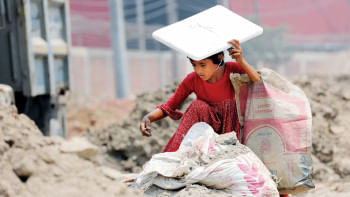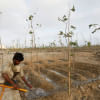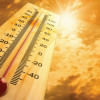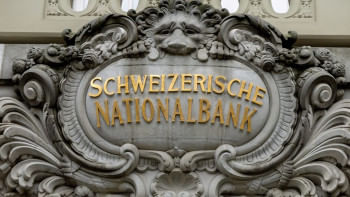Dhaka getting hotter

Dhaka is now one of the fastest-warming cities in the world, as it has seen a staggering 97 percent rise in the number of days with temperature above 35 degrees Celsius over the last three decades.
It ranks fifth on the list of hottest cities, trailing behind Delhi, Bangkok, Tehran, and Cairo, according to the International Institute for Environment and Development (IIED).
The UK-based independent policy research institute detected the trend after analysing temperatures in 20 of the most populous capitals for the last 30 years. The findings are yet to be made public.
"Bangladesh is experiencing more and more days of extreme heat because of climate change. This is having a major impact on the health, wellbeing, and productivity of all citizens, but especially those living in low income and informal communities," IIED Principal Researcher Anna Walnycki wrote in an email to this correspondent.
Experts also blame high population density, unplanned urbanisation, lack of green spaces, and global warming for the rapid rise in temperature.
"It is a result of local climatic change fueled by break-neck population growth. More people require more basic amenities, which lead to the degradation of the natural environment," said Ashraf Dewan, who teaches at the School of Earth and Planetary Sciences of Curtin University in Australia.
Building materials such as bricks used in cities for housing, particularly in developing countries, are not climate-sensitive. Hollow bricks do not retain heat while solid ones make dwellings hotter due to their high heat conductivity, the professor pointed out.
He further said local climate is impacted by different elements in a city. For example, the speed of wind that takes away heat is seriously lowered by buildings of various heights. Heat gets trapped and causes temperatures to rise.
According to Bangladesh Forest Department, 14 percent area of the country and only 9 percent of Dhaka city are covered in trees.
But according to Global Forest Watch, a mere 5.9 percent of the city is green.
In April, Bangladesh experienced the longest heatwave ever, and a mild to moderate heatwave is sweeping the country now.
Data from Bangladesh Meteorological Department (BMD) shows that the average maximum temperature throughout April was 36.2 degrees Celsius. With an average rainfall of just 1mm, the month was also the driest in 43 years.
"Responding to climate change is an unprecedented challenge for cities, especially in Bangladesh where extreme heat is becoming more common," Anna said.
"Extreme heat has a disproportionate impact on vulnerable people including the elderly and the young. Just last month, we saw another real-world example of this with the closure of schools."
Last month, the government kept the primary and secondary schools, colleges, and madrasas closed for days as certain regions saw temperatures of 40C or more.
Anna noted, "Low-income households have limited capacity to adapt to extreme heat because they have limited resources and inadequate building design and poor access to water and electricity.
"It is going to require bold action from policymakers, particularly when it comes to helping local communities adapt to this new reality."
According to the health directorate, at least 15 people died from heatstroke in April. However, the actual number could be higher as the directorate started keeping records from April 22, twenty days after the heatwave began searing the country.
Talking to this newspaper, Saber Hossain Chowdhury, minister of environment, said, "Over the years, Dhaka has witnessed a significant loss of green spaces and waterbodies. We must not only retain what we have, but also act now to increase these. Dhaka urgently needs to heal and also be made resilient to inevitable higher levels of warming in the future as this is the new normal."
"The city has formidable challenges -- growing population, high density thereof, vibrant growth of the economy and global warming. We need coordinated action involving a number of agencies and ministries. The Ministry of Environment, Forest and Climate Change is taking the initiative to convene a meeting in this regard. Our ministry wants to invest in urban forestry leveraging satellite mapping."

 For all latest news, follow The Daily Star's Google News channel.
For all latest news, follow The Daily Star's Google News channel. 










Comments